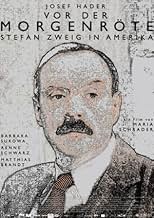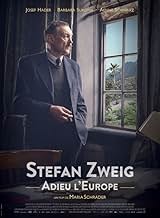AVALIAÇÃO DA IMDb
6,7/10
2,8 mil
SUA AVALIAÇÃO
Adicionar um enredo no seu idiomaBefore Dawn charts the years of exile in the life of famous Jewish Austrian writer Stefan Zweig, his inner struggle for the "right attitude" toward the events in war torn Europe, and his sea... Ler tudoBefore Dawn charts the years of exile in the life of famous Jewish Austrian writer Stefan Zweig, his inner struggle for the "right attitude" toward the events in war torn Europe, and his search for a new home.Before Dawn charts the years of exile in the life of famous Jewish Austrian writer Stefan Zweig, his inner struggle for the "right attitude" toward the events in war torn Europe, and his search for a new home.
- Direção
- Roteiristas
- Artistas
- Prêmios
- 6 vitórias e 10 indicações no total
- Direção
- Roteiristas
- Elenco e equipe completos
- Produção, bilheteria e muito mais no IMDbPro
Avaliações em destaque
'Stefan Zweig: Farewell to Europe' is a movie which, although a good one, left me slightly unsatisfied. I was interested, at times impressed, at others amused by Maria Schrader's film, but in the end, not totally conquered.
* Interested because Zweig is among my favorite writers and my being given the opportunity to revisit his life and ideas (even if in a restricted manner like here) could not possibly leave me indifferent. Moreover the cast, composed of Austrian, German and Portuguese actors, is chosen to perfection. Josef Hader embodies the great writer most convincingly and Barbara Sukowa as Friderika, his ex-wife, is her usual competent self. As for Aenne Schwarz, she reveals an engaging personality as Lotte, Stefan's second wife. * Impressed by the virtuosity of director Schrader (the dazzling opening sequence set at the Jockey Club ; the closing one leaving the vision of Zweig and Lotte's dead bodies off-camera except for a transient reflection in the mirror of a wardrobe). * Amused by the indescribable humor of the long sequence staging the botched reception of Stefan and Lotte in a remote village of Bahia State, the plump henpecked mayor delivering a clumsy address under the control of his domineering wife, followed by the harrowing performance of a local brass band striking up to play one of the worst versions of "The Blue Danube" ever to be heard. A comical episode but in no way gratuitous insofar as it reinforces the notion that Zweig is in awkward position, at once fascinated by his adopted country and lost in deep, irremediable uprooting.
So what accounts for the slight feeling of insatisfaction that was mine after viewing the film: too many speeches perhaps (what is indeed less humane than these exercises in rhetoric convincing only the convinced and leaving the others listening distractedly and yawning discreetly ?); the narrative process chosen (Zweig's life from 1936 to 1942 presented in five barely related episodes and an epilogue) not allowing to know Zweig intimately enough? For example, I would have liked to know on what grounds Zweig had divorced Friderika, how he formed a new couple with Lotte, how Stefan persuaded Lotte to follow him in death... I dare say that to avoid being accused of making a merely illustrative biopic told in chronological order (the critics' latest pet aversion), some filmmakers tend to uselessly break down temporality. This is precisely what, in my case, lessened the emotional impact of this otherwise thought-provoking film. A little more continuity would have resulted in a little more adherence to the story and its characters, a must-be when one deals with such a connoisseur of the human soul as Zweig.
But those are only reservations, not a rejection of the movie. Even with what I consider its shortcomings (not everybody's point of view for that matter, 'Stefan Zweig: Farewell to Europe' remains a respectable work, which will not make you waste your time.
* Interested because Zweig is among my favorite writers and my being given the opportunity to revisit his life and ideas (even if in a restricted manner like here) could not possibly leave me indifferent. Moreover the cast, composed of Austrian, German and Portuguese actors, is chosen to perfection. Josef Hader embodies the great writer most convincingly and Barbara Sukowa as Friderika, his ex-wife, is her usual competent self. As for Aenne Schwarz, she reveals an engaging personality as Lotte, Stefan's second wife. * Impressed by the virtuosity of director Schrader (the dazzling opening sequence set at the Jockey Club ; the closing one leaving the vision of Zweig and Lotte's dead bodies off-camera except for a transient reflection in the mirror of a wardrobe). * Amused by the indescribable humor of the long sequence staging the botched reception of Stefan and Lotte in a remote village of Bahia State, the plump henpecked mayor delivering a clumsy address under the control of his domineering wife, followed by the harrowing performance of a local brass band striking up to play one of the worst versions of "The Blue Danube" ever to be heard. A comical episode but in no way gratuitous insofar as it reinforces the notion that Zweig is in awkward position, at once fascinated by his adopted country and lost in deep, irremediable uprooting.
So what accounts for the slight feeling of insatisfaction that was mine after viewing the film: too many speeches perhaps (what is indeed less humane than these exercises in rhetoric convincing only the convinced and leaving the others listening distractedly and yawning discreetly ?); the narrative process chosen (Zweig's life from 1936 to 1942 presented in five barely related episodes and an epilogue) not allowing to know Zweig intimately enough? For example, I would have liked to know on what grounds Zweig had divorced Friderika, how he formed a new couple with Lotte, how Stefan persuaded Lotte to follow him in death... I dare say that to avoid being accused of making a merely illustrative biopic told in chronological order (the critics' latest pet aversion), some filmmakers tend to uselessly break down temporality. This is precisely what, in my case, lessened the emotional impact of this otherwise thought-provoking film. A little more continuity would have resulted in a little more adherence to the story and its characters, a must-be when one deals with such a connoisseur of the human soul as Zweig.
But those are only reservations, not a rejection of the movie. Even with what I consider its shortcomings (not everybody's point of view for that matter, 'Stefan Zweig: Farewell to Europe' remains a respectable work, which will not make you waste your time.
A great film . For message, for fine exporation of immigration in war time, for acting and for the impressive solution - the mirror on the door of wardrobe as good example.
Indeed, it seems a sketch.
Good cinematography, impressive acting but not very profound, to thesistic accents.
But, for me, this is its basic virtue. The humanism of Stefan Zweig , expored, in gentle manner from inside, the essence of the great ideas reflected by his books, ambiguities poetic used, the pressure of friends and ex enemies to be helped, saved, his power accentuating his vulnerabiity.
It is more than a biographic film. For the magnificent work of Josef Hader, for the inspired perspective of Maria Schrader , it represents a wise remind of fundamental values defining our society.
Indeed, it seems a sketch.
Good cinematography, impressive acting but not very profound, to thesistic accents.
But, for me, this is its basic virtue. The humanism of Stefan Zweig , expored, in gentle manner from inside, the essence of the great ideas reflected by his books, ambiguities poetic used, the pressure of friends and ex enemies to be helped, saved, his power accentuating his vulnerabiity.
It is more than a biographic film. For the magnificent work of Josef Hader, for the inspired perspective of Maria Schrader , it represents a wise remind of fundamental values defining our society.
What a masterpiece in quiet tones, insinuation and blank spaces. And the viewer needs to fill and interpret them. What Maria Schrader did not do is a biopic by numbers, but - by showing sketches of a few days of Austrian-Jewish writer Stefan Zweig's life in exile in Brazil during WWII - what happened without a doubt to many other artists, intellectals and others who had fled the German nazi regime. Josef Hader's acting is brilliant, how he hurries from government reception to PEN congress to press conference - always keeping up appearances but beyond his friendly and modest behaviour and the thankfulness to his hosts lies despair about the state of things in europe, his uprooting and depression. Only on occasion - when he speaks with his ex-wife (absolutely wonderful: Barbara Sukowa) and a befriended journalist (likewise: Matthias Brandt) who - coincindentially - moved into the neighbourhood of his last residence, Petropolis - he finally reveals it: 'How can anyone stand this at all?'. Or, in another scene you can see it in his touched-wistful gaze when an untalented brass band gives a poor performance of 'Auf der schönen blauen Donau" ('On the blue Danube') during an improvised (and very funny) reception in a province town in the jungle. The epilogue, shortly after his and his current wive's suicide, again shows the mastery of Maria Schrader's direction: dry police procedural, shocked neighbours and officials, mourning or praying friends, Matthias Brandt reading the suicide note - a panopticon in the wardrobe mirror that occasionally shows the two dead bodies. You only sit there and you are amazed and deeply moved. What a fantastic film!
Josef Hader is one of the best actors you will ever see. Believe it. If you do not know anything about Zweig and if you want to see Hader acting, because you have not seen him before than go for this one. It is entertaining enough to sit it through somehow. And Hader is - as always - a magnet to the eyes. But apart from Haders's acting this movie is a disaster. Zweig's life has so much potential, but Maria Schrader decided to show Zweig's inner struggle with his emigration from Europe to America in 5 or 6 long snapshot-dialogues. And to deliver the message with everything what happened in Zweig's life, Schrader was forced to bend the talking in the dialogues in such a way that all information was said in some sort of everyday tittle-tattle between Zweig, his wives, and other people. So the movie gets very artificial and artistically forced. And so we got tired in our seats. It would have been much better to make a mock-documentary about Zweig (with Hader). Anyway, for lovers of great acting I recommend it, but only because of Hader's unmissable acting: to be honest, Hader could play an old sneaker resting for years in a shoe box and it would still be worthwhile seeing it.
--> lack of plot or interest. Great acting, dialogue, casting, etc, etc. But just too talky, boring and ultimately I no longer cared what was going to happen (although I pretty well knew in advance how things turned out, anyway).
Você sabia?
- CuriosidadesOfficial submission of Austria for the 'Best Foreign Language Film' category of the 89th Academy Awards in 2017.
- ConexõesFeatured in Women Make Film: A New Road Movie Through Cinema (2018)
- Trilhas sonorasThe Blue Danube Waltz
Composed by Johann Strauss
Principais escolhas
Faça login para avaliar e ver a lista de recomendações personalizadas
- How long is Stefan Zweig: Farewell to Europe?Fornecido pela Alexa
Detalhes
- Data de lançamento
- Países de origem
- Central de atendimento oficial
- Idiomas
- Também conhecido como
- Stefan Zweig: Farewell to Europe
- Locações de filme
- São Tomé e Príncipe(Bahia, Brazil)
- Empresas de produção
- Consulte mais créditos da empresa na IMDbPro
Bilheteria
- Faturamento bruto nos EUA e Canadá
- US$ 78.372
- Fim de semana de estreia nos EUA e Canadá
- US$ 11.729
- 14 de mai. de 2017
- Faturamento bruto mundial
- US$ 1.370.772
- Tempo de duração
- 1 h 46 min(106 min)
- Cor
- Proporção
- 2:39
Contribua para esta página
Sugerir uma alteração ou adicionar conteúdo ausente


























